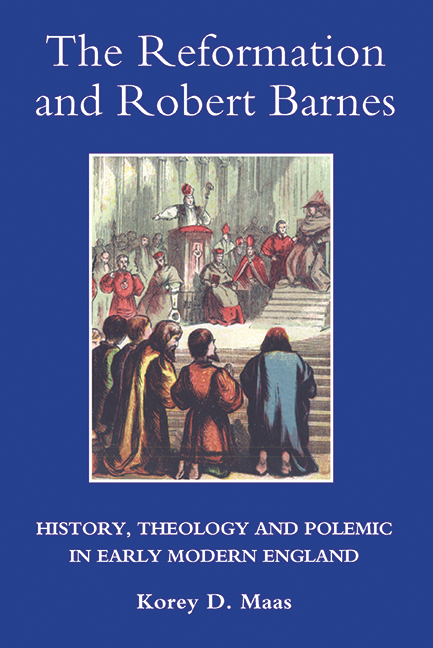Book contents
- Frontmatter
- Contents
- Dedication
- Acknowledgments
- Abbreviations and short titles
- Introduction
- Part I The Life and Theology of Robert Barnes
- Part II Barnes's Programme: History, Theology, and Polemic
- Part III The Reception and Revision of Barnes's Programme
- 6 The Evangelical Evaluation of Barnes's Programme
- 7 Robert Barnes: His Successors and His Legacy
- Bibliography
- Index
- Miscellaneous Endmatter
6 - The Evangelical Evaluation of Barnes's Programme
from Part III - The Reception and Revision of Barnes's Programme
Published online by Cambridge University Press: 11 May 2017
- Frontmatter
- Contents
- Dedication
- Acknowledgments
- Abbreviations and short titles
- Introduction
- Part I The Life and Theology of Robert Barnes
- Part II Barnes's Programme: History, Theology, and Polemic
- Part III The Reception and Revision of Barnes's Programme
- 6 The Evangelical Evaluation of Barnes's Programme
- 7 Robert Barnes: His Successors and His Legacy
- Bibliography
- Index
- Miscellaneous Endmatter
Summary
If the conclusions of the previous section are correct, and if the programme pursued by Robert Barnes can best be described as one of historical-theological polemic, it must be asked why this particular interpretation has not been previously put forward. Though there is by no means an overabundance of literature on the life and work of Barnes, those authors who have ventured to offer an analysis of his significance for the sixteenth-century reformation almost invariably reach one of two conclusions. Especially among those writers whose unmistakable agenda is to illustrate the Lutheran origins of England's reformation, Barnes's significance is summarised with the description of him as ‘Luther's English connection’. That is, Barnes was the most prominent of the English reformers to maintain a consistently Lutheran confession of faith, as well as the individual who most clearly promoted this confession among his countrymen. As a large number of Lutheran works composed in Latin were circulating in England even before Barnes began to publish, it should be noted that this conclusion typically gives special weight to Barnes's promotion of Lutheran doctrine in the vernacular, especially by means of his Supplications to the King. Even if such authors were not narrowly focused on the reception of Lutheran doctrine in England, it is not difficult to see how such an emphasis on Barnes's Supplications, and a corresponding neglect of his Latin writings, might result in their failure to stress the historical bent which is most discernible in his Latin works. This is especially true in those cases where the Supplicatyon is read in its 1531 edition, which did not include what is by far the most historically driven article to be published under that title, that concerning clerical marriage.
While the portrait of Barnes primarily as a populariser of Luther has certainly detracted from an investigation of his own more original programme, this is also the case with the even more common emphasis on Barnes as martyr. This has been highlighted by Alec Ryrie, for instance, who describes Barnes as a ‘more or less worthy footsoldier of the Reformation, then; but not a man whose life and works were especially worthy of memorialization’, and who goes on to argue that ‘it was principally the manner of Barnes’ death which secured what posthumous fame he had’.
- Type
- Chapter
- Information
- The Reformation and Robert BarnesHistory, Theology and Polemic in Early Modern England, pp. 167 - 205Publisher: Boydell & BrewerPrint publication year: 2010

